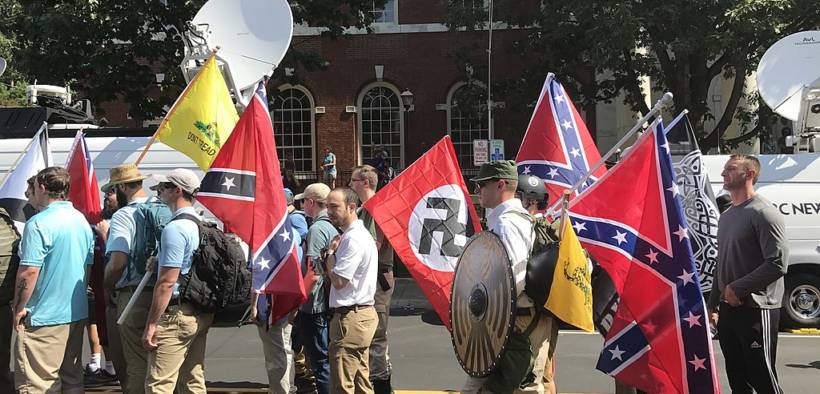FBI Elevates Threat Posed by White Supremacists

“We’re particularly focused on domestic terrorism, especially racially or ethnically motivated violent extremists. Not only is the terror threat diverse, it’s unrelenting.”
The FBI has raised the threat level of white nationalism, Director Christopher Wray announced on Wednesday. Violent extremism motivated by ethnic, racial, and religious differences will now be treated in the same category as ISIS. The action came after an uptick in Neo-Nazi activity.
Congress has often called on the FBI to do more to counter far-right threats, even as law enforcement has successfully prevented two recent synagogue attacks and the alleged planning of an attack at a pro-gun rally, Vice reported.
Increased Attention to Right-Wing Terrorism
“We’re particularly focused on domestic terrorism, especially racially or ethnically motivated violent extremists,” Wray said before the House Judiciary Committee. “Not only is the terror threat diverse, it’s unrelenting.”
Designating far-right extremism as a priority equal to ISIS will unlock more resources for the FBI to combat the growing trend, said Mark Concordia, FBI and New York State counterterrorism instructor and associate professor of criminal justice at Roberts Wesleyan College. The decision is not one the FBI would have made lightly, he said, but rather based on an in-depth analysis of trends in racially motivated hate crimes.
In the spring of 2019, the FBI created the Domestic Terrorism-Hate Crimes Fusion Cell, to facilitate information-sharing between the criminal investigation and terrorism divisions. Since 2001, racially-motivated terrorists have been the most common former of domestic terrorism, Wray said.
“They choose easily accessible weapons — a car, a knife, a gun, maybe an IED they can build crudely off the internet — and they choose soft targets,” Wray said. “That threat is what we assess is the biggest threat to the homeland right now.”
The difficulty in stopping them lies in both the method and location of attack. Wray said domestic terrorists are capable of moving “from rhetoric to violence” in a short manner of time, CBS News reported. “Lone actors” can be turned to violence without guidance from any particular group, such as the Neo-Nazi group The Base, which had eight members arrested in the foiled gun rally plot.
“Soft targets,” such as supermarkets, are commonly indefensible and at the very least unexpected to become the epicenter of a terrorist attack. Synagogues have become popular in extremist crosshairs. Last year, 11 Jewish worshipers were murdered in Pittsburgh. In 2018, hate crime murders peaked, according to CBS News, even as the number of total hate crimes had fallen following a 3-year rise.
In 2019, the FBI apprehended 107 domestic extremists, roughly the same number of international terror-related arrests, Wray said. Sources within the Justice Department reportedly told CBS News reporter Jeff Pegues that more arrests of white supremacists, particularly those with ties to organizations in Europe, Ukraine, and Russia, are coming down the pipe.
The President Incites Violence
The move to combat domestic terrorism, including right-wing white supremacists, can possibly be turned into a political issue and arguably already has. President Donald Trump campaigned on locking down America’s borders to states he believes export terrorists, predominantly Islamic, to America. He began his presidency by issuing a travel ban on Iran, Iraq, Libya, Somalia, Sudan, Syria, and Yemen.
Last month, he added Nigeria, Eritrea, Kyrgyzstan, and Myanmar to a list of sanctioned countries by prohibiting immigrants from them. Trump once again highlighted the fight against “radical Islamic terrorism” in his State of the Union address last month.
He stopped short of mentioning the threat white supremacists pose. Data from The Investigative Fund revealed an overwhelming amount of right-wing terror incidents compared to Islamic extremism. Over two-thirds of Islamist attacks were stopped from 2008 to 2016 compared to only a third of right-wing attacks, Vox reported.
Critics have blamed Trump for inciting violence among his base. Democratic candidate Michael Bloomberg called out Trump following the El Paso, Tex., massacre in August 2019.
“Words matter,” Bloomberg said in an interview with “Face the Nation” moderator Margaret Brennan. “The public reads, watches, listens to that, and that changes their behavior. People look to their leadership for guidance and to say that it doesn’t have an effect is wrong.”
At a rally in May 2019, Trump joked about shooting illegal immigrants crossing the Mexican border and his supporters cheered.
Trump has yet to comment on the FBI’s decision to elevate the threat level of white supremacists and Neo-Nazis.









